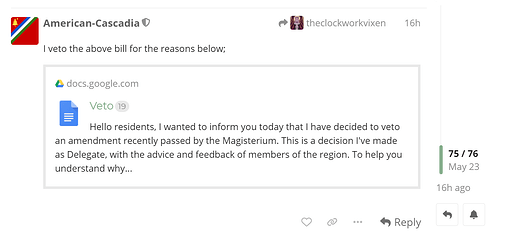| MOTION FOR CIVIL TRIAL | |||
|---|---|---|---|
| DEFENDANT | American-Cascadia / American-Cascadia, in their capacity as Delegate | REASON(S) FOR SUIT | Improper exercise of veto power based on criteria contrary to the Concordat |
| STATUTE(S) | Article B, Section 3, Part 1 and Part 2 of the Concordat | ||
| TRIAL | |||
| CHARGES ADVANCED BY- (indicate with "X ") | Bachtendekuppen X | ||
| DO YOU HAVE TEP CITIZENSHIP? (indicate yes with "X ") | (X) | ||
| SUMMARY OF EVIDENCE FILED (Verify Sending to Viceroy with an "X ") | (X) |
Summary of Evidence and Legal Basis:
Legal basis:
I hereby challenge the Delegate’s veto of Amendment A-2025-16 (Amendment to the Citizenship Act) on the grounds that the Delegate improperly exercised veto power by applying criteria contrary to Article B, Section 3, point 1 of the Concordat.
Article B, Section 3, point 1 reads: “1. Enactment, amendment, or repeal of legislation, and both ratification and repeal of a treaty or declaration of war submitted by the Delegate, shall be decided by majority vote.”.
While the Concordat does not require the Delegate to provide reasoning for a veto, when reasoning is voluntarily provided, it creates a basis for constitutional review. The principle here is that when government officials explicitly state their reasoning, those reasons must not themselves violate constitutional principles.
This case presents a very narrow ground for potential nullification. The Conclave’s power to nullify Delegate actions is properly limited to instances where such actions are “contrary to this Concordat or statutory law” (Article C, Section 4, part 1). This standard sets a high bar - it is not sufficient that an action be merely unwise or unpopular; it must specifically contravene the explicit provisions of the Concordat.
The Delegate initially vetoed the amendment citing an insufficient majority, stating it “met a legal majority by one vote” and implying this slim margin justified the veto. This reasoning establishes a supermajority requirement for legislation that is not present in the Concordat or any statutory law.
As such, the constitutional issue arises because the Delegate explicitly cited the slim majority as a primary justification for the veto. By doing so, the Delegate effectively attempted to impose a supermajority requirement for legislation where none exists in the Concordat.
The Delegate has since acknowledged the error in this reasoning, stating “I was wrong to state that it didn’t [meet a legal majority], and this was due to my lack of understanding of the voting process.” However, the veto remains in effect despite being at least partially based on this improper criterion.
However, government officials cannot shield potentially unconstitutional actions by bundling them with legitimate justifications. If the Delegate’s decision was substantially influenced by an improper consideration (imposing a de facto supermajority requirement), then the entire action is tainted and subject to nullification, even if other valid reasons were also provided.
Moreover, regarding partial nullification, the Concordat is clear: “The Conclave may rule on the actions of the Delegate… and nullify any which are contrary to this Concordat or statutory law.” The text refers to nullifying “actions” in their entirety, not portions of actions or just their reasoning. This suggests that if an action is found to be partly motivated by unconstitutional reasoning that materially influenced the decision, the entire action must be nullified.
This does not mean the Delegate cannot subsequently issue a new veto based solely on constitutionally permissible grounds.
I request therefore the Conclave review this action and rule that the Delegate’s veto, Unconcordatially imposing a supermajority, constitutes an action contrary to the Concordat, and nullify it under Article C, Section 4, Point 1 of the Concordat.
Evidently, I recuse as Arbiter from this matter.
Evidence:
Veto.pdf (47.9 KB)
[AMENDMENT] Citizenship Act - The Magisterium - Tep Forum.pdf (2.4 MB)
